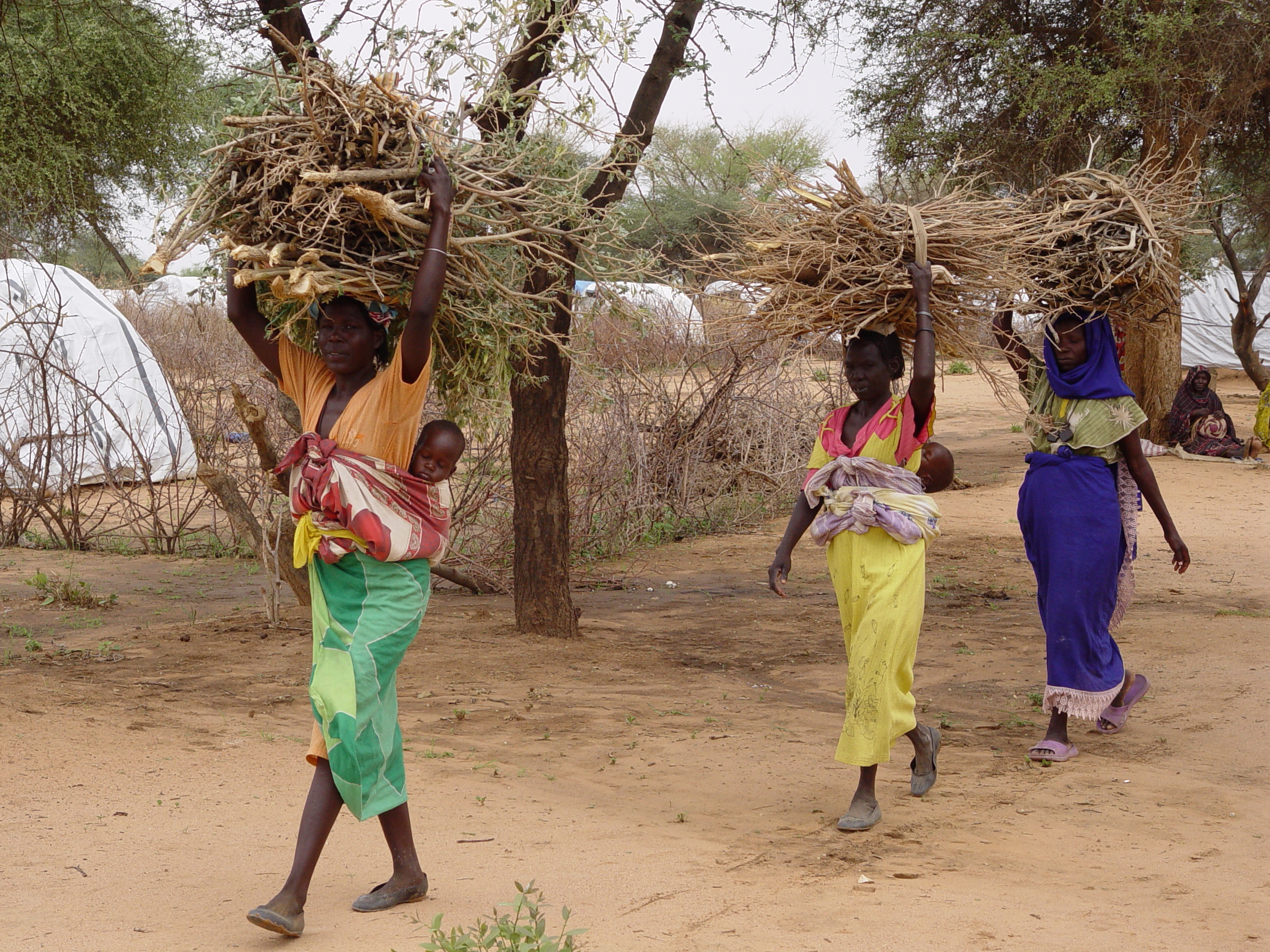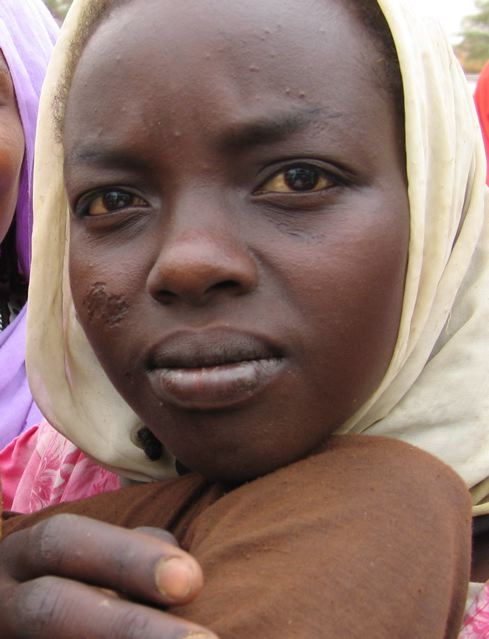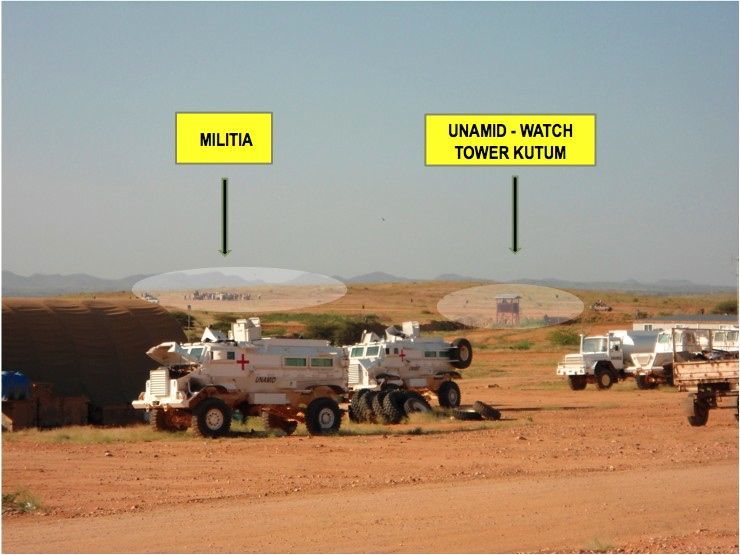[November 7 update from Radio Dabanga: Appendix 2]
In the immediate wake of the UN’s whitewashing of UNAMID’s past failures to report, and prevent, atrocity crimes in Darfur (see below), the Mission has now deliberately and consequentially lied about an investigation of the rape of some 200 girls and women in the Tabit area of North Darfur. Tabit (13.313°N | 25.087°E) is some 30 miles southwest of el-Fasher, capital of North Darfur and the location of UNAMID headquarters. From el-Fasher UNAMID, were it willing, is capable of projecting all necessary military protection needed for the investigation of serious crimes committed at such a short distance. UNAMID has declared to various news agencies, including Reuters and Agence-France Presse, that their team sent to investigate this ghastly episode in unconstrained sexual violence was prevented from entering Tabit by Khartoum’s security forces. This not only bespeaks a crippled mission but is also deeply false.
Darfuri eyewitnesses from Tabit have reported to multiple sources, including this writer, that UNAMID did in fact enter Tabit, specifically on Tuesday at 5:00am. Once in Tabit, UNAMID investigators spoke for at least ten minutes with four villagers at the transportation center in the town. There the UNAMID investigators received full confirmation of the sexual violence that raged from Friday, October 31 to Sunday afternoon, November 2. It is a deeply disturbing and all too revealing fact that instead of admitting what investigators had discovered speaking with eyewitnesses, UNAMID claimed the team had been stopped at the checkpoint outside Tabit. As the conversation between UNAMID investigators and the four villagers continued, four cars containing Military Intelligence personnel roared onto the scene; those present quickly walked away. They report that having walked some distance, they watched as Military Intelligence—which has long had the primary security role in Darfur—spoke with UNAMID investigators for half an hour. The UNAMID investigators then returned back to El Fasher.
Some of the women abandoned by the international community
But this is what has been reported, on the basis of UNAMID statements, by news agencies (here the UN News Center, 5 November 2014):
The African Union-United Nations hybrid mission in Darfur (UNAMID) has expressed its “deep concern” about allegations circulating in local media over the mass rape of 200 women and girls in a town in the region’s North, declaring that it is conducting a thorough investigation into the veracity of the claims.
In a press statement today, the Mission cited reports of the alleged mass rape in the town of Tabit, located 45 kilometres southwest of El Fasher, in North Darfur. A UNAMID verification patrol was immediately dispatched to conduct an investigation but upon reaching the outskirts of the town was denied access by Sudanese military at a checkpoint. “The Mission leadership is calling on authorities of the Government of Sudan to grant UNAMID’s unhindered access to all Darfur, especially to areas where alleged incidents affecting civilians have been reported,” the statement read, adding that UNAMID remained “determined to obtain crucial information and leads.”
But all these claims are belied by the fact that UNAMID investigators, even in the course of a ten-minute conversation with Tabit villagers, were able to confirm the basic facts about the horrific events: that some 200 girls and women were in fact raped (and here Military Intelligence did nothing to intervene) from October 31 to November 2 in the Tabit area. UNAMID was not “denied access by Sudanese military at a checkpoint”: they allowed themselves to be expelled from the scene of what they themselves had already confirmed was a massive atrocity crime. There is no reconciling these two accounts of the investigative failure of the UNAMID mission; clearly the fabrication of how events unfolded was meant to spare, yet again, UNAMID leadership from the task of reporting such crimes and thereby angering Khartoum.
One scarred young victim of rape (photograph by Mia Farrow)
[It is worth recalling that Tabit has been the target of previous violence: On 17 August 2012, following evening prayers, the town was attacked by Khartoum’s paramilitary Central Reserve Police. The assault had hallmarks of a deliberate massacre, and was part of the violence that escalated dramatically in summer 2012.]
[An account of what precipitated this extraordinary violence has been compelling presented by The Times (London), 6 November 2014; see Appendix 1]
Defending UNAMID at the cost of the truth
The recent UN report on UNAMID’s performance—coming in the waking of authoritative accusations of malfeasance, negligence, and mendacity by Aicha Elbasri, former UNAMID spokeswoman—has not been released publicly, but Colum Lynch of Foreign Policy has posted the text in connection with his current analysis of the findings; Lynch broke the original story in Foreign Policy in which Ms. Elbasri’s account of UNAMID’s deliberate under-reporting and non-reporting of serious crimes was presented in very considerable and persuasive detail.
What we have been told in the report is woefully inadequate, and doesn’t begin to address countless events in which UNAMID has failed to protect or report atrocity crimes since assuming its mandate to do both in January 2008 (the time-frame for events investigated is less than a year, Ms. Elbashri’s tenure as UNAMID spokeswoman). Despite withholding information, despite changing the names of perpetrators when forces of the Khartoum regime are involved, despite remaining silent about Khartoum’s threat to attack UNAMID, and despite failing to report what are clearly war crimes, the world is evidently expected to take Secretary-General Ban Ki-moon’s dismay as adequate in speaking to the contents of this report:
United Nations Secretary-General Ban Ki-moon said he is “deeply troubled” by the findings of a review conducted into recent allegations that the UN-African Union peacekeeping force in Sudan’s Darfur region intentionally sought to cover up crimes against civilians and peacekeepers.
In a statement released today by his spokesperson, Mr. Ban said he will take “all necessary steps to ensure full and accurate reporting by [the joint mission],” so that sensitive information is systematically brought to the attention of UN Headquarters and the Security Council in a timely manner. (UN News Center, 29 October 2014)
But the “statement” by Ban referred to here declares, outrageously:
A review, initiated by the Secretary-General, was conducted into recent allegations that the African Union-United Nations Hybrid Operation in Darfur (UNAMID) intentionally sought to cover up crimes against civilians and peacekeepers. The Review Team examined all the material related to 16 incidents, which were the basis of these allegations. It also interviewed former and current staff in UNAMID and at UN Headquarters. The Review Team did not find any evidence to support these allegations.
Incredibly, Ban is speaking here of a report that contains only five examples, but each of them extraordinarily revealing (all but one from North Darfur alone):
- Tawilla (North Darfur): UNAMID failed to share with DPKO a copy of the verification report on the attacks, rapes and looting at four villages in Tawilla by pro-Government forces. As a consequence and while the initial incident was brought to the attention of the Security Council, the verified findings were neither brought to the attention of Council members nor included in the Secretary-General’s report to the Security Council.
- Kushina (North Darfur): In reporting an aggressive overflight by two Government attack helicopters, UNAMID did not report to UNHQ the verbal threat by the Government to bomb/attack the convoy from the air or mention that it was carrying an arms expert from the Panel of Experts on the Sudan. Full disclosure of the incident only came to the knowledge of the Security Council through an incident report from the Panel of Experts.
- Hashaba (North Darfur): There was reasonable evidence, including as reported internally within UNAMID, that members of the Border Guards were involved in this attack and went on to commit crimes and human rights abuses. This was not reported by UNAMID to UNHQ nor was there ever a public statement issued condemning the criminal action.
- Sigili (North Darfur): UNAMID chose not to report to UNHQ the threat by PDF members to identify and kill Zaghawas travelling in a UNAMID convoy carrying two Zaghawa villagers. The patrol returned to base only after the PDF searched the UN vehicles and began aggressive questioning of Sudanese national staff of UNAMID. The Mission reported the patrol as being aborted due to time lost at a check point, making it unable to fulfill its mission.
- Muhajeria Team Sit (South Darfur): There was considerable evidence and reason to believe that the fatal attack on this Team Site was carried out by pro-Government forces. A military investigation, the report of an integrated mission and the report by the Panel of Experts on the Sudan all confirm this. Although there were two attacks that night, only the second and fatal attack was ever reported publicly. DPKO described the attackers as “unidentified assailants” due to lack of certainty in the identity and affiliation of the assailants. The Government agreed to investigate, but after more than a year justice has still not been done.
[The exceedingly brief and weirdly incomplete UNAMID statement on the occasion of the attack on Muhajeria may be found here.]
What is the difference between “not reporting” and “covering up”? It is a question that has been asked by, among others, former members of the UN Panel of Experts for Darfur. This is UN double-speak at its very worst.
Moreover, as the events at Tabit make perfectly clear, UNAMID is committed to defending itself in the face of massive failure by any means possible, and “full and accurate reporting” is not among them. Ban Ki-moon, for his part, even when presented with evidence of UNAMID’s failures to report serious crimes and violations of international law, cannot do more than urge what amounts to some corrective action in reporting protocols.
UNAMID—simply watching
UNAMID is not a mission that can be fixed, or re-tooled, or made into an effective reporting or protective force; it is a mission that has failed and this failure has been consistently obscured by both African Union senior officials and UN officials, including Hervé Ladsous, head of the UN Department of Peacekeeping Operations. So desperate has Ladsous been in defending the largest and most expensive UN peacekeeping operation in the world, even as he knows full well that it is failing, that he has in the past attempted to begin a draw-down of UNAMID forces, claiming that the security situation was improving and that the size of UNAMID should be dictated by the “reality on the ground”:
UN Peacekeeping Chief Hervé Ladsous is recommending that the organization drawdown its UN-African Union peacekeeping force in the Darfur region of Sudan by more than 4,000 troops and police in the coming months. Ladsous said Thursday that improvements on the ground justify the move. (Voice of America, 25 April 2012)
In fact, the surge in violence and insecurity in Darfur that continues to the present was well underway at the time Ladsous made these hideously expedient remarks. Ladsous remains head of UN peacekeeping, even as his response to Darfur is only one of a number of failings.
Serious action is long overdue in holding the UN Secretariat accountable for enabling the lies and failures of UNAMID. The people of Darfur are owed at least a truthful account of their suffering and losses. This most recent internal report on serious allegations, which are essentially dismissed, should galvanize at least the U.S. and European missions to the UN to speak out and demand that Darfur’s truths be spoken publicly. Given past performance, however, this is unlikely. The task of speaking the truth about UNAMID and the spineless performance of Ban Ki-moon over the past six years is evidently too daunting. This is especially true when it comes to the African Union Peace and Security Council, now deeply invested in making of UNAMID a success story. Indeed, the AUPSC has already declared that UNAMID offers a model worth “emulating” in future African Union peacekeeping missions. Such unchallenged mendacity is not the least disgraceful part of the international response to genocide in Darfur.
Appendix 1:
“Soldiers raped 200 women and girls in Darfur,” The Times (London), 6 November 2014; Ruth Maclean, Johannesburg
Sudanese soldiers raped more than 200 women and girls in Darfur last week, according to villagers. An elder from the village of Tabit said a military commander at a nearby garrison accused the villagers last Friday of harbouring a missing soldier and gave them until sunset to return him. The villagers had no knowledge of the soldier, but when night fell, soldiers surrounded Tabit, beat the men and chased them away, before raping the women and girls, including eight primary school pupils. The commander, armed with a machinegun and accompanied by some of his forces, returned to the village and apologised on Monday, explaining that the missing soldier had been found.
He asked for the names of the women and girls and offered to take them to a military hospital in north Darfur. In the immediate aftermath of the attack his soldiers had prevented the women from leaving the village to seek medical treatment. “We refused his apology,” the elder said. “[We] demand the formation of an independent investigation into the crime, and to bring the perpetrators to justice.”
Families have fled Tabit for nearby refugee camps.
Appendix 2:
“Arab coalition calls for fair inquiry into North Darfur mass rape”


